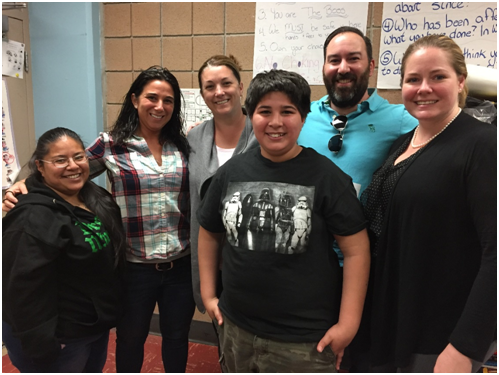Bridges’ Team Aids Adolescent and his Family
Three weeks into the new school year, eleven year old Patrick was admitted to the child psychiatric unit of a local hospital. Patrick had been having significant difficulty communicating, and was prone to telling strange stories. School staff were concerned about his behaviors and thinking, which appeared to indicate a possible emerging psychosis.
Patrick was referred to Bridges’ Intensive In-home Child and Adolescent Psychiatric Services (IICAPS) program, and after a thorough evaluation the team, including Bridges’ medical and clinical staff determined that Patrick did not meet the criteria for a psychotic disorder. The team identified that Patrick’s communication and behavior issues were a result of intellectual and developmental disabilities. His story-telling was his attempt to communicate his thoughts and feelings the best way he could.
During his hospitalization, Patrick was terrified and angry, and his family was frightened and confused. It was a traumatic experience for all, and left them feeling overwhelmed, anxious and distrustful of the mental healthcare system, and the people they thought could help them.
“Having Patrick hospitalized had a huge impact on him and his family. Our job was to ensure that Patrick was diagnosed correctly, and then put the appropriate services in place to help him and his family recover from the experience, learn to recognize and manage emotions and behaviors, and develop tools to improve Patrick’s ability to communicate,” said Bridges’ IICAPS clinician, Breanna Sansone.
Team Encouragement
 Seven months later, on a bright spring morning Patrick enters his school social worker’s office for his regular team meeting, accompanied by Mrs. Garfield, his special education teacher. He lights up when he sees his mom, Liz, and immediately leans over to hug her. They share a moment that reveals a deep bond and his affectionate nature. Patrick has a shy smile, bright eyes, and now towers over his diminutive Mom. He greets Mrs. Scheibel, the school social worker, and his Bridges’ ICAPS team, Breanna and John Parise. His team encourage him to remember things they have talked about, how he is feeling, and how his life is different now. “I never want that to happen again,” he says, shuddering at the memory of the time in the hospital.
Seven months later, on a bright spring morning Patrick enters his school social worker’s office for his regular team meeting, accompanied by Mrs. Garfield, his special education teacher. He lights up when he sees his mom, Liz, and immediately leans over to hug her. They share a moment that reveals a deep bond and his affectionate nature. Patrick has a shy smile, bright eyes, and now towers over his diminutive Mom. He greets Mrs. Scheibel, the school social worker, and his Bridges’ ICAPS team, Breanna and John Parise. His team encourage him to remember things they have talked about, how he is feeling, and how his life is different now. “I never want that to happen again,” he says, shuddering at the memory of the time in the hospital.
Patrick and his family received IICAPS services for six months.
These services are designed to help children who have been hospitalized, or who are at risk of hospitalization or out-of-home placement to remain at home safely with their families while receiving treatment. It is a research-based model that relies on a working partnership between the child, the family and the treatment team. Services include: individual and family therapy, psychiatric consultation, crisis intervention, school consultation and parent guidance and training in behavior management techniques, plus case management support. Bridges has operated its IICAPS program since 2002.
Working together as an IICAPS team for 8 years, Breanna and John have formed a strong partnership and work tirelessly to help the families and their children achieve the best possible outcomes. “This is not a 9-5 job,” said Breanna. “It is important that we are readily available, and keep the lines of communication open between the families and the treatment team at all times.” Breanna and John joke like good friends and say they often complete each other’s sentences. They value each other’s skills, respect one another’s opinions, and it is clear that Patrick is perfectly comfortable with them.
Collaborative Treatment
This team has placed Patrick and his family at the forefront of their work. While they laugh about the “thousands of text messages sent at all hours” to keep on top of numerous issues that arise in the care and treatment of a child and family, the critical nature of their work. They discuss coping strategies and the innovative tools they use to help Patrick communicate his feelings, and efforts to help Patrick’s dad understand and manage his own emotions and attitudes about the challenges his children and his wife were facing. Patrick’s mom says she had been completely overwhelmed, trying to manage the needs of her three children, and help her husband through the process. Patrick’s dad has become more involved in learning how to help his children and family and commends the IICAPS team for helping improve the family’s relationships and facilitating the progress they have made.
The team gives much credit to the family itself, noting how hard it is for many families to acknowledge problems, and implement the changes needed for the health and well-being of their children. “This family has been incredibly open to learning and changing. We are gratified that they have given us their trust and view us all as partners, all motivated by the desire to help Patrick and improve their lives,” said John.
The partnership with the school staff has been equally important to this success. “Working collaboratively to ensure that the treatment plan and approaches we developed with the family is consistently applied at home and in school has made all the difference, said Breanna. According to the team, consistency is crucial, especially for children who are living with intellectual, mental health and other challenges. “From the start we knew that our staff had to be on the same page as the IICAPS team, and fortunately we quickly developed a great working relationship and a strong bond to support this family,” added Mrs. Scheibel.
A Positive New Direction
The family has completed the program and will be discharged this month. The team addresses Patrick’s worries that he will no longer be meeting Breanna and John for their lunch and talks each week. They re-assure him that he will continues to have support at school and home, and that he knows how to recognize when he is anxious and upset, and to use the coping skills he has developed to manage through tough times.
As the meeting ends, his team reminds Patrick of all “the positives” that have occurred over the past several months. “That’s the path we are going to stay on, the positive path,” commented Mrs. Scheibel. Patrick agrees with a nod and a grin, as he says good bye to his mom and his team, and heads back to class.
Parents who are concerned about their children’s behavior or a potential mental health disorder can keep these four fundamental principles in mind:
- Model that asking for help is a strength and something you respect.
- Give them as much control of the process as possible.
- Control your natural urge to “fix” the problem.
- Have faith in your child.
For more information or assistance on IICAPS or other Bridges’ programs, contact us at 203.878.6365 or visit www.bridgesct.org.
